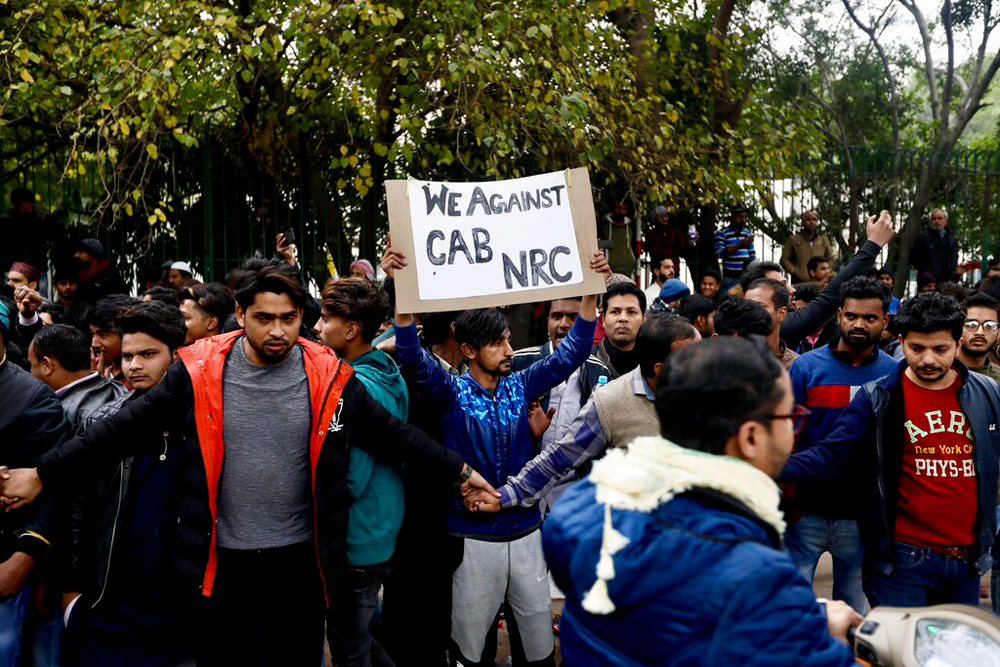Protests against the Citizenship (Amendment) Act 2019 at Jamia Millia Islamia entered the third day on Monday even as protestors from various educational institutes across India took to the streets in support of students of the varsity as well as those of Aligarh Muslim University, who faced police brutality a day earlier.
The police and paramilitary forces have been accused of entering the two universities without permission and resorting to violence, including the use of excessive force against the demonstrating students. The Delhi police detained 50 injured students and locked them up at two police stations in south Delhi — Kalkaji and New Friends Colony.
Many students described the situation on the campus on Sunday as “war-like”. They alleged that the police had fired tear gas inside the library to force the students out.
The police, however, brushed aside the allegations, saying the force only responded to mob violence. The DCP (South East Delhi), Chinmoy Biswal, maintained that the force went after a violent mob and not the students.
The detention of students from the college and the hospitals led to protests outside the police headquarters in Delhi with a large number of city residents responding to a call given by the JNU and DU students’ unions.
Teachers, lawyers, rights activists, politicians and journalists participated in all-night vigils at police stations to demand answers from the force and ensure the well-being of the students. The students were eventually released after 3am.
Earlier on Monday, the Congress observed a sit-in at India Gate, led by party general secretary Priyanka Gandhi Vadra. Opposition leaders, including those of the Left, condemned the police action.
The Telegraph spoke to the students who were in the library and were caught in the police crackdown. Here are their accounts:
Abuzar Akhtar, Sanskrit certificate student
I was in the Dr Zakir Hussain library when we saw the police come in. The policemen broke the glass on doors and windows and fired tear gas at us. About 70 students were in the reading hall on the ground floor. Students, startled by the tear gas, tried to leave the building when we saw that the police had besieged the library. We ran inside and went upstairs. There were some people upstairs. There were some girls, too; we asked them to go upstairs. Later, the police told us to leave our bags inside and begin walking with our hands raised. We complied, mostly because we had been studying and not protesting. As we walked towards the main hall across the main entrance, around 15 policemen surrounded us and started beating us like animals. When we asked them why were they attacking students, they replied: “Tum log padhai nahi, gundagardi kar rahe ho. Tum logon ko sudharne hum aaye hain (You don’t study; instead, you are thugs. We are here to set things straight).” Both the police and paramilitary forces were inside. They were aiming for our heads, not legs or hands. They came with a mission to create terror.
We managed to escape somehow. But all the gates of the university were being manned by the police. We ran back towards the central canteen, where two big trash cans are usually kept. I hid in one of those. When the police started searching for people, two of us managed to hide in an elevator. About one-and-a-half hours later, the police left. During the time, they searched and beat up students wherever they could find them. Guards (of the university) had told us not to return to our hostels, so we left for Batla House. I was hit in the head, back and hands. There’s swelling everywhere. I went to a private clinic in Batla House for treatment.
Zulkarnain, PhD student of political science
I was walking down from the hostel when it all started. I rushed to the library believing it would be safe. When the police entered the campus, the students switched off all the lights in the library. The police broke down the library gate and fired tear gas inside. I was in the PhD section of the library. It was filled with smoke and many students, including the girls, had trouble breathing. Two-three of them were in a bad shape, panicking more as it got difficult to breathe.
The only way was out but the police thrashed us with lathis even there. The police asked us to lift our hands and walk out. They then led us toward Sarai Jullena. And the police, even as they beat us, said “in jihadiyon ka yahi upai karna padega (these jihadis deserve this treatment)”. More than 200 people were there when they led us out. It was so barbaric that it felt like the state apparatus had failed. When we pleaded and asked why were they doing this to the students, the police kept saying they were only following orders.










